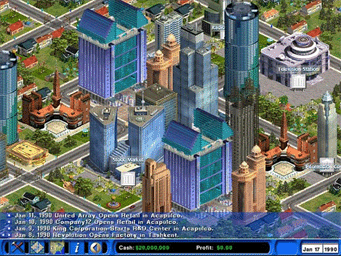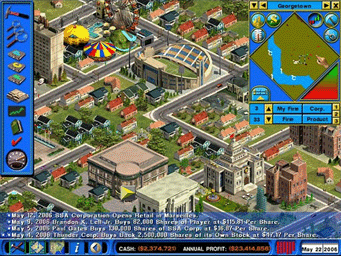Everyone knows about the laws of supply and demand. Say the word “economics” and that’s the immediate thought. People generally know that as price rises, demand falls and supply rises—and if price falls, supply falls and demand rises. Business people know it, and they exploit it. They know how to use the market and extract every little dollar they can from the consumers.
It’s the result of capitalism. Free-market economy. Personal entrepreneurship. It’s business today, and this environment has never been captured better than in Capitalism II. In fact, it’s replicated so well that the game is used as training in businesses.
This level of complexity and the incorporation of pretty much everything businesses do can be very daunting for someone who comes to the game fresh. Definitely, this one is for the strategy moguls—the ones who want that extreme, in-depth modelling of real life. And Capitalism II definitely provides.
As an economics and business-management student, it’s an absolute joy to both play and study this game, applying theory from class. It is that reflective of life. Price elasticity is taken into account, as are long run and short run costs and circular flow of income. The in-game towns have their own economies and recede and boom according to real-world laws.
In essence, this game could be termed a business version of Sim City, but that label really doesn’t do Capitalism II justice. The simple version of the game is this: You set up your business in a few cities around the world, where there are firms already established. You begin to create products in factories, shipping them to stores where you then sell goods and hopefully make a profit.
But really, the game is much more complex than that. You compete for market share. Other firms will attempt predatory pricing. They’ll try to buy you out of advertising. You’ll enter into purchasing contracts with suppliers. Et cetera. You can appoint others in your headquarters to manage operations, marketing and everything else. Global and city-wide economic conditions will affect your business as well, and you have to deal with them. A fully-functioning share market, in which people can buy and sell shares, also exists. The market crashes or has dips, and mad selling ensues. Just like in real life.
The game’s graphics are fine for a strategy title, enough to see what you’re doing without having to put Coke glasses on. Really dated pictures of products, though. Seriously, the cola cans look like they’re from 1982. And the menus look like that weird 3D thing that older Final Fantasy games used to call “cutscenes”.
I played Capitalism II with the sound off, so I can’t comment on that. All I heard before I turned it off was clicks when I pressed an item on the menu. The controls are nice and smooth, and the interface is easy to navigate. No complaints there.
Rookies to the strategy genre should just stay the fuck away, because playing Capitalism II would be a horribly bad experience for you. Organizing every little bit of the business is a fiddler’s dream (actually,scratch that; it sounds a bit wrong), and it’ll be daunting for any newcomers. For them, it’ll be harder to get around than Robbie Coltrane. But, you lovers of complex-as-fuck games are certainly in for a treat.


